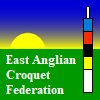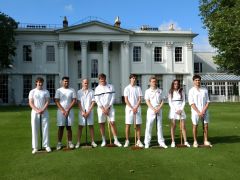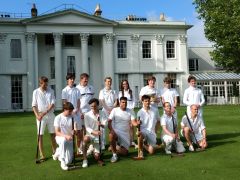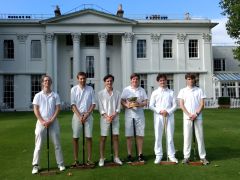

Two years had passed since the last Varsity match following the cancellation of the 2020 event because of the Coronavirus pandemic, and many students at both universities had moved on. So with many new faces in both teams, could Cambridge retain the edge they had gained in 2019?
Both teams arrived on time for the 10am start at Hurlingham on a cool and overcast morning. The Hurlingham courts were as immaculate as ever, and although following overnight rain they were only medium-paced by the standards of top-class venues, they were still much quicker than the college lawns and playing fields that the players were used to.
The morning doubles started shortly after 10am with a lot of cautious juggling for position but little progress. Eventually Oxford made their first hoops on the top two courts, and Cambridge the first on the third, but breaks of any size were nowhere to be seen. The speed of the courts was still sometimes being underestimated with some long rolls ending up with croqueted balls off the court. After 75 minutes of play only 5 hoops in aggregate had been scored on the top court, 11 hoops on the second and 6 on the third. Then finally after about 90 minutes of play Oxford's Mark Baker decided it was time to make some serious progress and took a break to penult, where he failed his approach and rather strangely sent his ball to A-baulk, conceding contact there. Meanwhile on the bottom court Cambridge's Lachlan Chavasse failed 3 attempting to make the hoop off his partner ball, sticking tight in front of the hoop, only to see his opponent hit the 20-yarder from near hoop 4 through the jaws of 3!
Progress continued slowly on all three courts, and as the agreed time-limit approached Oxford had a comfortable lead on the top court thanks to Mark Baker's earlier break, but it was still quite close on the second court with Cambridge having a small lead. On the third court with only 5 minutes to go it was even closer with all four clips on hoop 4, but at this point Oxford's Nick Orr hit in and managed to set up a 4-ball break and make 3 hoops when time was called. Meanwhile Cambridge managed to hang on to their 3-hoop lead on the second court. So the score at lunchtime was 2-1 to Oxford.
Fortified by lunch and with their inhibitions suitably lowered by some accompanying alcohol, both generously provided by Hurlingham members, the players re-engaged battle for the six games of afternoon singles. There was still everything to play for.
On the top court Mark Baker made a good start, soon making a break with yellow to reach hoop 4, followed not long afterwards with a break for red that he took through 11 hoops, conceding a contact to his opponent Finn Sutcliffe with the balls all well separated. Finn was subsequently able to make three hoops with black and a decent break of seven hoops with blue while Mark progressed his backward yellow ball to peg, but Mark's initial lead was never seriously challenged and he finished with a comfortable +16 win with some time to spare.
The other five games remained in play until close to the time limit. On one of these it became significantly more difficult for your reporter to follow what was happening with the double-bankers as players with the secondary colours there had started with their clips on hoop 3, i.e. with the court rotated 180° with respect to the primary-coloured game. It was then even more difficult when what at first appeared to be a series of turns played by both sides with a wrong ball turned out to be the "right" ball but the wrong colour! The players had decided to play with green and pink vs. brown and white. This colour confusion was subsequently rectified with a ball swap, only for further spectator bafflement when it emerged that the players in this game had also turned right for 1-back after hoop 6 and had repeated hoop 3 (which, with their court still being rotated 180° had a blue top) so that their hoop sequence for the last 6 hoops was an east-west mirror image of the normal sequence - but with the baulk lines remaining un-mirrored so that 2-back and 4-back (i.e. respectively hoops 2 and 4 on a "normal" court) could be run at a relatively safe distance from baulk. And finally for good measure, "rover" was then also run in the wrong direction. But since both players in the game seemed content to play with their unusual court geometry and agreed the eventual outcome, the conditions of Law 4(c) ultimately applied!
As the time limit approached Lachlan finally managed to peg out for a +19 win for Cambridge. The remaining four games were all curtailed by the clock, with the second game on the top court between Oxford's Harry Anderton and Felix O'Rahilly and the second game on the bottom court between Oxford's Joshua Thomas and Roland MacFall being the closest, both finally falling Oxford's way with scores of +2 and +1 on time respectively. Oxford also wrapped up timed wins in the other two games to conclude a solid 7-2 win for Oxford.
Regardless of the result, the games were all played in good spirit throughout. It was apparent that all the players and spectators greatly enjoyed the occasion and were grateful for the kind hospitality once again shown by the Hurlingham club and its members.
 The Cambridge team |
 The players |
 The Oxford team |
|
Photo gallery |
Scores (Oxford names first) | |
|---|---|---|
|
all games Level Advanced
|
See also:
Oxford University Association Croquet Club
Cambridge University Association Croquet Club